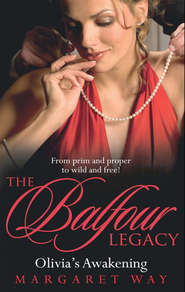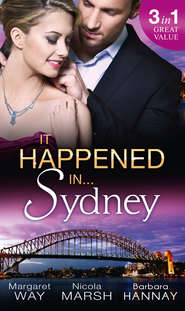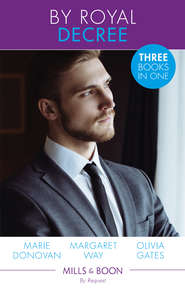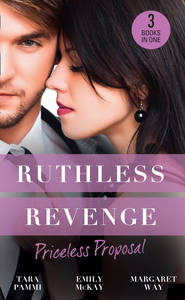По всем вопросам обращайтесь на: info@litportal.ru
(©) 2003-2024.
✖
Australia's Most Eligible Bachelor / The Bridesmaid's Secret: Australia's Most Eligible Bachelor
Автор
Год написания книги
2019
Настройки чтения
Размер шрифта
Высота строк
Поля
“Do I look like I’m joking?” He lifted a black brow. “I’m very serious about this, Miranda. You’re not just another brilliant student we’re sponsoring. The two of us have a strong connection. Your mother is married to my father. Many people thought it would be all over within a year or two, but they were wrong. She knows exactly how to handle him.”
“It has to be sex,” she said with a dark frown. “Razzle-dazzle.” Leila Rylance was famous for her beauty and glamour, her parties. From all accounts she had made herself knowledgeable about the political and big business scene. Even the art world, where she was fêted by gallery-owners. Leila was right at the top of the tree when it came to social-climbers.
“Don’t knock it,” Corin was saying dryly. “It’s important. Dad is still a vigorous and virile man. Besides, Leila has numerous other wiles at her disposal. She runs his private life and the house—indeed the houses all over the world—with considerable competence. She’s no fool. She’s appears very loving, very loyal, very respectful. She hangs on my father’s every word.”
“But is it for real?” Miranda demanded with a good deal of fire. “She obviously didn’t win you and Zara over.”
There was a flash in his brilliant dark eyes. “He brought her frequently to the house before our mother died, like she was a colleague and not an employee well down the rung. Fooled no one. At one stage I thought our housekeeper Matty was planning on poisoning her over morning tea. Matty adored our mother. Leila spent a lot of time trying to charm us. We were only children, but thinking children. We could see she posed a real threat to our parents’ marriage. Dad lusted after Leila long before she got him to marry her.”
She studied his handsome, brooding face, seeing how it must have been for him and his sister. “So hurting people didn’t concern her? Between the two of them they must have broken your mother’s heart.”
His expression was grim. “It was pretty harrowing for all of us. My beautiful mother most of all. I can’t talk about it, Miranda. I’ll never forgive either of them.”
“Why would you? I’d feel exactly the same. I do feel the same. The thing is, do they know? Does your father know? You’re his heir.”
He gave a brief laugh. “My grandparents, the De Laceys, are major shareholders. My grandfather Hugo still sits on the board. It was he who staked my father in the beginning—a lot of money, I can tell you. I have my mother’s shares. And Zara and I will have our grandparents’ eventually. Dad couldn’t overthrow me even if he wanted to. Which he doesn’t. In his own peculiar way he’s proud of me. It’s Zara, my beautiful, gifted sister, he endeavours to avoid. I look like him, except his eyes are a piercing pale blue and mine are dark.”
“They’re beautiful eyes,” she said without thinking.
“Thank you.” He smiled, thus lightening the atmosphere. “But I still say yours are the most remarkable eyes I’ve ever seen.”
“Someone has them,” she said. “My biological father? Some member of his family? Even you with all your resources couldn’t find out who my father was.”
“We couldn’t, and Lord knows my people tried. But we don’t know if it’s a good or a bad thing. Some people don’t want to become involved—not many years after, when the pattern of their lives is set. No one in the area where your grandparents and Leila lived fitted the bill or the time frame. It could have been someone she just happened to meet—”
“Like a one-night stand?” Miranda said sharply. “Barely sixteen, and Leila was taking lovers? Or was she raped? I can’t bear to think about that.” She shuddered. “My grandmother was convinced from the way Leila acted and spoke that wasn’t the case.”
Corin’s eyes never left her face. “There’s no way to tell, Miranda. I’m sorry. Only Leila knows. One day you might get the opportunity to ask her—” He broke off at a discreet tap on the door, calling for entry. A young woman Miranda had never seen before wheeled a trolley into the office.
“Thank you, Fiona. We’ll take it from here.”
“Yes, Mr Rylance.” Fiona flashed him her most dazzling smile, at the same time managing to give Miranda a comprehensive once-over.
Fiona left. Miranda stood up. “I’ll pour. No milk? Teaspoon of sugar?” She remembered.
“Fine.” His mind was clearly focused on something else.
“Want one of these sandwiches and a Danish?”
“Why not?” He went back to sit at his desk.
They were both settled before he spoke again. “This coffee is good.”
“Nothing less than the best.” It was very good. So were the neat little chicken sandwiches and the freshly baked mini-pastries. She was hungry. She’d only had fruit for breakfast. Papaya with a spritz of lime.
“Money would be made available for you to travel,” Corin said, setting down his coffee cup.
She looked at him in amazement. “You can’t be serious, Corin! Why would you do that? I’m taking enough. Can I say no?”
His brilliant eyes burned into her. “Better to say yes, Miranda.”
“Oh, Lord!” She took another hasty swallow of the excellent coffee. “You’re worried about burnout. Is that it?”
“There is such a thing. We both know that. The sheer drudgery of study. Your friend Peter almost died from an overdose.”
Her head sank. “Poor Peter!” Peter—her friend, the brilliant class geek. She had looked out for him from the start. When other students had tended to mock his extreme shyness and his bone-thin appearance she had been his constant support. Peter’s appearance at that stage of his life hadn’t matched up with his formidable brain.
“You were devastated,” Corin reminded her. Did she know poor Peter idolised her?
“Of course I was devastated,” she said, lifting her head. “We were supposed to be friends, but he never told me how bad he felt. Why didn’t he? I could have helped.”
“You can’t blame yourself, Miranda. You were a good friend to Peter, but his depression got the better of him. He was the classic square peg in a round hole.”
“Wasn’t he just?” She sighed. “I’m so grateful you were there for me that night.” Not knowing what else to do, she had called Corin from the hospital and he had come. “I’ll always remember that. And what you did for Peter afterwards. You spoke to his family. They listened. They’d been blind to the fact Peter wasn’t meant to be a doctor. With the family medical background they more or less forced him into it. Peter desperately wanted to become a musician. His ambition wasn’t taken at all seriously until you spoke up.”
“I wanted to help.”
“Well, you did.” These days Peter was studying the cello at the very prestigeous Royal College of Music in London.
“Still hearing from him?” Corin asked.
“All the time.”
She smiled. A sweet, uncomplicated smile. Peter was her friend. No more. He would never be her lover. He was glad about that. He didn’t stop to question why. But emotions had such intrusive, pressing qualities. Sometimes they had to be pushed away.
“I love Zara’s rainforest painting,” she said, gesturing to it.
“So do I. Zara keeps up her painting. I’ll find one of hers for you. I have quite a collection. But we’re not talking about Zara. Or Peter—though I’m very glad to hear he’s doing so well. We’re talking about you, Miranda. I firmly believe you’ll benefit from a gap year.”
Her fingers laced themselves together.
“Don’t argue. You wanted to fast-track science, remember?”
She looked across at him with pleading eyes. “I could have done it in two years had I worked through the long vacations.”
His tongue clicked with impatience. “Why won’t you admit you were glad when I made the decision for you? I’m on your side, Miranda. I’m simply not going to allow you to crash and burn. Two years was far too gruelling for a three-year science course and you know it. No time at all for a personal life.”
“Who needs a personal life?” she asked discordantly, stretching her slender arms along the sides of the armchair. “You’re a workaholic, though rumour has it you’re going to marry Annette Atwood. She’s stunning.”
He let the silence build. “So she is,” he agreed eventually. “But you appear to know more about it than I do.”
“You’re not?” It came out far too intensely. Damn, damn, damn.
“Let’s get back to you,” he said smoothly, aware she hadn’t meant to show such interest. “Professor Sutton shares my view you’d benefit from a gap year. And there’s a man who thinks the world of you.”
Her expression softened. “The Prof would like me to stick to science. He’s told me many times. He thinks I have a future in medical research. When you think about it, nine of our ten Nobel Prize winners have been medical scientists, or doctors of medicine. And Patrick White, of course, for Literature. I know at some future stage the Prof would like me to be in a position to make his team. I’m sure he’s told you he’s enormously grateful for the funding he receives from the Foundation?”
“He’s doing great work,” Corin acknowledged, as though that said it all. “Research doesn’t appeal to you?”











